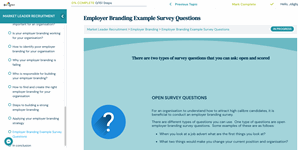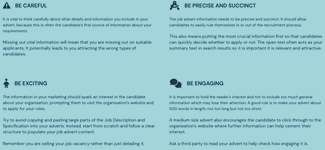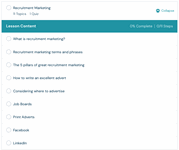
Market Leader Recruitment
Learn how to build and develop an outstanding recruitment function via a course packed with resources and 1-2-1 support.
Bright
Summary
- Tutor is available to students
Overview
Packed with 16 modules of content, our Market Leader course focuses on helping recruitment leaders build, enhance and develop a market-leading recruitment function. Our course includes a wide range of templates, case studies and digrams to help you make the most of each module. We also provide three hours of tutor support and unlimited email support to help you apply each topic to your organisation or business!
Course media
Description
Our market leader course includes 16 modules on a wide range of topics.
Job Analysis
This module covers how to research who you need to recruit. It is the prerequisite step to planning your recruitment campaign and the first step towards your new employee starting employment.
Done correctly, job analysis forms the backbone of your entire recruitment campaign. Done incorrectly, job analysis can lead you down the incorrect path, ending in the hire of the wrong person for your job post.
Recruitment Planning
By this stage you should know what skills, experience and knowledge is required to perform well in the vacant job post. Recruitment planning creates a bespoke recruitment process for your campaign, based solidly on your job post requirements.
Recruitment Marketing
This module looks at how best to market your job vacancy. Whether this is through the more traditional medium of print or through a job board, there are a lot of points to consider.
Each method has a multitude of advantages and disadvantages. Making the right or wrong decision at this stage can be the difference between filling your job vacancy and not filling it.
Shortlisting
Shortlisting is the process of deciding which of your applicants to take through to the next stage of your recruitment process, the assessment stage. This module covers all you need to know about successfully shortlisting the right candidates.
Giving Feedback
Feedback can be used for all sorts of situations, from a member of staff underperforming to providing feedback to an unsuccessful candidate.
Done right it can be a valuable tool to help people progress, but done poorly it can impact on your organisation's reputation and demotivate the receiver.
Assessment and Selection
Assessing candidates during the recruitment process involves understanding whether a candidate has the experience, talent, skills and values required to perform well in a particular job post.
It is the most essential part of the recruitment process as it allows you to select the right people for your job post. Research shows that as often as 74% of the time the wrong person will be hired for the job post.
Candidate Sourcing
Candidate Sourcing is an important part of an organisation's recruiting strategy. Traditionally it is focused on advertising roles, searching candidate databases and approaching candidates through Social Media.
Recruiters who actively source candidates take an approach to go directly to candidates, rather than waiting for the candidates to come to them. Although it can be time consuming, active candidate sourcing can help to reduce time-to-fill and cost per hire.
Candidates found through this method also tend to be a better fit as the recruiters will have already conducted an initial screening of the candidate's skills and experience.
The Offer Stage
Recruitment is often as much about selling your organisation to a candidate as it is about the candidate selling themselves to your organisation.
At the offer stage candidates must feel they are being offered a role with an organisation that values them and that aligns with their personal values.
Although it is one of the final stages of the recruitment process, the offer stage can instantly change the candidate's views and feelings about the organisation. Even when a good impression has been created during the earlier stages.
Onboarding and Induction
Onboarding is focused on building engagement prior to a successful candidate starting with an organisation. It is concerned with setting expectations for both the employee and the organisation with regards to the initial few months of joining. At this stage, developing the future employee’s knowledge of your culture will strengthen their commitment through role clarity and self-efficacy.
Induction takes place once the successful candidate has started in their job post and is focused on introducing them to their duties, and the wider organisation, in a structured manner. It’s an important process for settling new employees into your organisation.
Early Careers Recruitment
In today’s early careers recruitment market, organisations need to be able to adapt to a variety of changing factors. From increasing numbers of applications to innovative new techniques for engaging and attracting the best candidates, organisations need to be able to ensure their teams are able to maximise opportunities.
Recruitment Metrics
Recruiting metrics refer to data gathered and analysed from your recruitment process. This data can then be analysed and tracked to establish hiring success, candidate experience and areas of recruitment that need to be improved.
When carried out correctly, measuring recruitment metrics can help you increase your return on investment and optimise your recruitment process, allowing more informed decisions to be made by your organisation. If the data used to create recruitment metrics is incorrect, the output and decisions that come from it will also be incorrect.
The role of Social Media within Recruitment
For any organisation looking to enhance their recruitment, social media is a must. However, there are more platforms than ever before and the potential to damage an organisation's reputation can be great.
Knowing which social media is the most successful for a particular role is essential to finding and recruiting high quality candidates. From the top social media sites, Facebook, LinkedIn and Twitter, it is important to know what their benefits are to maximise return on investment.
Effective talent pooling
Talent pools can be a brilliant way to sustainably reduce your cost and time to hire. By adding candidates to a database for future use you are improving your access to engaged and suitable candidates with every job advert you place.
In such turbulent recruitment times, it is important that you give consideration to which roles you don't struggle to recruit with as you do for those hard-to-fill roles. By populating a database with candidates for all roles you help to future proof your organisation for any changes in what is easy or hard to recruit for.
Employer branding
An organisation's employer brand should provide a window into the work environment and culture that a successful applicant will be a part of. Employer branding is the process of managing, determining and maintaining your reputation as an employer amongst prospective candidates, employees and key associates. Find out how to build and grow an effective employer brand.
Diversity and Inclusion
Within recruitment, diversity and inclusion is engaging with, interviewing and employing individuals across a diverse range of backgrounds. Inclusive recruiting covers considerations around a number of areas, such as gender, upbringing and religion.
Inclusive recruiting is a focus on understanding how current recruitment and unconscious bias can get in the way of valuing people from all walks of life and how they might benefit your organisation.
Cultural fit
Employees who identify more with their organisation experience greater job satisfaction, are more committed, perform better and are more likely to stay with the organisation. That is why cultural fit is important.
Having a strong culture that you can demonstrate to candidates from the start, gives future employees an idea of what it is like working for your organisation.
Who is this course for?
This course is for recruiters, hiring managers and talent specialists aiming to build the best recruitment function possible.
Requirements
It is important to have some recruitment experience but we do cover the basics too.
Career path
This course would be great for anyone looking to become an inhouse recruiter or anyone currently working as an inhouse recruiter.
Questions and answers
Reviews
Currently there are no reviews for this course. Be the first to leave a review.
Legal information
This course is advertised on reed.co.uk by the Course Provider, whose terms and conditions apply. Purchases are made directly from the Course Provider, and as such, content and materials are supplied by the Course Provider directly. Reed is acting as agent and not reseller in relation to this course. Reed's only responsibility is to facilitate your payment for the course. It is your responsibility to review and agree to the Course Provider's terms and conditions and satisfy yourself as to the suitability of the course you intend to purchase. Reed will not have any responsibility for the content of the course and/or associated materials.






